Headlines
Certificate Forgery: Buhari’s CoS, Abba Kyari in Hot Soup
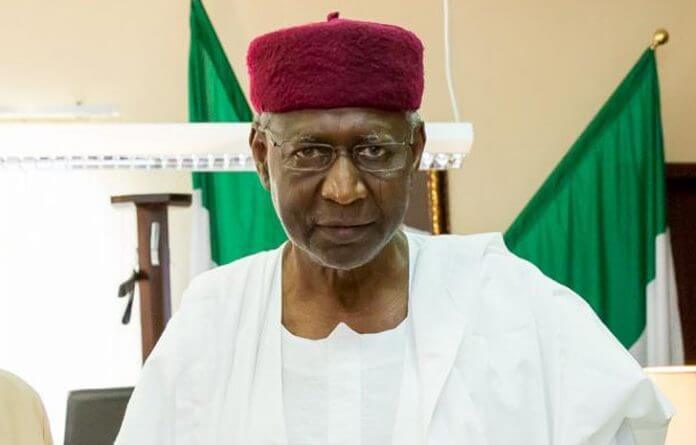
By Eric Elezuo
The Chief of Staff to President Muhammadu Buhari, and one his closest confidants, Mr. Abba Kyari, may be in for the greatest test of his career as a lawyer, Mr. Kalu Kalu Agu of Kalu and Kalu Associates has petitioned the Metropolitan Police, London, alleging that the President’s right hand presented a forged document and lied on oath while testifying on behalf of the President and the ruling All Progressives Congress (APC) at the just concluded Presidential Election Tribunal.
The man, who is regarded as the brain box of the Buhari administration, found himself on the other side of the law, when on July 30, 2019, while standing as a prime witness for Buhari and the APC, declared that he personally took delivery of a Cambridge Assessment International Education document issued in the name of Mohammed Buhari.
In the petition titled PETITION AGAINST MR. ABBA KYARI FOR FORGING CAMBRIDGE ASSESSMENT INTERNATIONAL EDUCATION DOCUMENT, and addressed to the Metropolitan Police Commissioner, Mr. Agu requested the outfit to conduct an official investigation to determine the circumstance behind the procurement of the said document in the terms of source of procurement and other sundry matters.
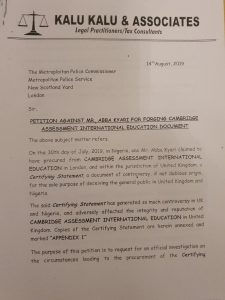
In its opening paragraph, the petition noted thus;
“On the 30th of July, 2019, one Mr. Abba Kyari claimed to have procured from CAMBRIDGE ASSESSMENT INTERNATIONAL EDUCATION in London and within the jurisdiction of the United Kingdom a certifying statement , a ddocument of controversy, if not dubious origin for the sole purpose of deceiving the general public in the United Kingdom and Nigeria”
Faulting the process under which the document was procured, which the petitioner claimed nullified its authenticity, he further highlighted seven basic tips that supported his motion under which a third party can be issued the document. These, he said were revealed from the website of the Cambridge Assessment International Education. Among them is “that the CAMBRIDGE ASSESSMENT INTERNATIONAL EDUCATION only delivers the said ‘CERTIFYING STATEMENT’ either by email or by post and not by personal collection”.
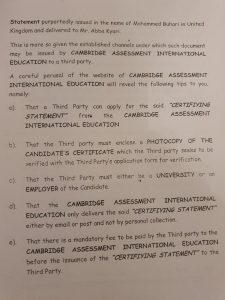
Consequently, Mr. Agu called for the investigation of the said misrepresentation taking into consideration the following:
- Where did Mr. Kyari get the certificate which he enclosed alongside his application form for the issuance of the said “CERTIFYING STATEMENT” which he claimed he procured from CAMBRIDGE ASSESSMENT INTERNATIONAL EDUCATION among five other demands.
- Whether Mr Abba Kyari as an individual can apply for the said “CERTIFYING STATEMENT” not being an ACADEMIC INSTITUTION or an EMPLOYER of the candidate?
- Whether the said “CERTIFYING STATEMENT” can be delivered to Mr. Abba Kyari by hand as he claimed he signed and personally collected same by hand in UK?
- Evidence of the said application by Mr. Abba Kyari to the CAMBRIDGE ASSESSMENT INTERNATIONAL EDUCATION
- Evidence of the mandatory payment of the fee for the issuance of the said “CERTIFYING STATEMENT”
- Evidence of the candidate’s AUTHORISATION to the CAMBRIDGE ASSESSMENT INTERNATIONAL EDUCATION for the release of the said “CERTIFYING STATEMENT” to Mr. Abba Kyari
The petitioner concluded by praying thus:
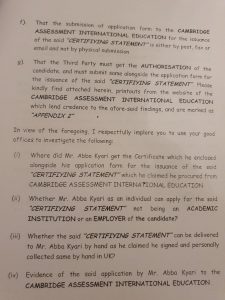
“With the greatest respect, sir, in the circumstance the said “CERTIFYING STATEMENT” claimed to have been procured by Mr. Abba Kyari is found to be forged, it will be of great service to United Kingdom, Nigeria and the International Community that Mr. Abba Kyari is arrested and arraigned in a court of competent jurisdiction in the UNITED KINGDOM for FORGERY.
Mr. Kyari, a prominent member of the President Buhari cabinet, has been in the news mostly for the wrong reasons ever since he joined the administration took root on August 27, 2015. He has been accused in many quarters as being the ‘head of the cabal’ Nigerians have speculated as leading the government. He is also a close relative of President Buhari.
A product of three prominent England based institutions of higher learning, Abba Kyari worked for the law firm Fani-Kayode and Sowemimo for some time after his return to Nigeria. He also served as Editor with the New Africa Holdings Limited Kaduna. In 1990 he served as Commissioner for Forestry and Animal Resources in Borno State. From 1990 to 1995, Kyari was Secretary to the Board of African International Bank Limited. Abba Kyari was Executive Director, Management Services, United Bank for Africa Plc. (UBA) and was later appointed Managing Director and Chief Executive of the Bank. He was appointed a Director of Unilever Nigeria Plc in 2002 and is a Director of Exxon Mobil Nigeria. He is a recipient of the Nigerian Honor Award of Officer of the Order of the Niger (O.O.N).
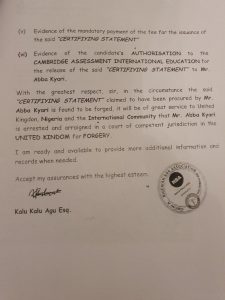
Mr. Agu, on his part, has remained an albatross on the neck of President Buhari and his administration, moving from one court to another and seeking one injunction after another against the incumbent.
In January 2019, Agu joined the duo of Labaran Ismail and Hassy El-Kuris, to stop President Buhari from contesting the 2019 Presidential Election, alleging that the President lied in his form CF 001 submitted to the Independent National Electoral Commission regarding his educational qualifications and certificates. However, the case was struck out in July by a three-member panel of justices, which unanimously held that the matter lacks merit, having been filed outside the time provided by Section 285 of the Nigerian Constitution.
If the Metropolitan Police heeds the petition, and conducts an investigation, it may just boost the chances of Alhaji Atiku Abubakar and his party, the Peoples Democratic Party (PDP) as the tussle to snatch Buhari’s presidency gets tougher.
Headlines
US Lawmaker Seeks More Airstrikes in Nigeria, Insists Christian Lives Matter

United States Representative Riley Moors has said further military strikes against Islamic State-linked militants in Nigeria could follow recent operations ordered by President Donald Trump, describing the actions as aimed at improving security and protecting Christian communities facing violence.
Moore made the remarks during a televised interview in which he addressed U.S. military strikes carried out on Christmas Day against militant targets in North-west Nigeria.
The strikes were conducted in coordination with the Nigerian government, according to U.S. and Nigerian officials.
“President Trump is not trying to bring war to Nigeria, he’s bringing peace and security to Nigeria and to the thousands of Christians who face horrific violence and death,” Moore said.
He said the Christmas Day strikes against Islamic State affiliates had provided hope to Christians in Nigeria, particularly in areas affected by repeated attacks during past festive periods.
According to U.S. authorities, the strikes targeted camps used by Islamic State-linked groups operating in parts of north-west Nigeria.
Nigerian officials confirmed that the operation was carried out with intelligence support from Nigerian security agencies as part of ongoing counter-terrorism cooperation between both countries.
The United States Africa Command said the operation was intended to degrade the operational capacity of extremist groups responsible for attacks on civilians and security forces.
Nigerian authorities have described the targeted groups as a threat to national security, noting their involvement in killings, kidnappings and raids on rural communities.
Moore said the strikes marked a shift from previous years in which attacks were carried out against civilians during the Christmas period. He said the U.S. administration was focused on preventing further violence by targeting militant groups before they could launch attacks.
U.S. officials have said the military action was carried out with the consent of the Nigerian government and formed part of broader security cooperation between the two countries. Nigeria has received intelligence, training and logistical support from international partners as it seeks to contain militant activity.
Moore had previously called for stronger international attention to attacks on Christian communities in Nigeria and has urged continued U.S. engagement in addressing extremist violence. He said further action would depend on developments on the ground and continued coordination with Nigerian authorities.
Nigerian officials have maintained that counter-terrorism operations are directed at armed groups threatening civilians, regardless of religion, and have reiterated their commitment to restoring security across affected regions.
Headlines
Renowned Boxer Anthony Joshua Survives Ghastly Road Accident

World-renowned boxer Anthony Joshua on Monday survived a ghastly road accident in Makun, Ogun State.
Eyewitnesses report that the incident occurred along a busy highway of the Lagos-Ibadan expressway.
The vehicle carrying Joshua, a Lexus Jeep with the number plate, KRD 850 HN, reportedly collided with a stationary truck under circumstances that are still being investigated.
Joshua reportedly sustained minor injuries, while two persons were said to have died on the spot.
Headlines
Atiku Warns Against Hasty Re‑gazetting of New Tax Laws

Former Vice President Atiku Abubakar has cautioned that any attempt to hurriedly re‑gazette Nigeria’s new tax laws could undermine parliamentary oversight and set a dangerous constitutional precedent.
Atiku’s warning follows public scrutiny over reports that the Tax Reform Acts signed by President Bola Tinubu differ from the versions passed by the National Assembly. Lawmakers, including Abdussamad Dasuki, raised concerns that the alterations could pose serious legal and constitutional risks, noting that they were not backed by any constitutional framework.
In a statement on X, Atiku said the directive to re-gazette the Acts effectively confirms “that the gazetted version of the Tinubu Tax Act does not reflect what was duly passed by the National Assembly,” calling it “a grave constitutional issue.”
He emphasized that under Section 58 of the 1999 Constitution, a bill only becomes law after passage by both chambers, presidential assent, and gazetting.
“Gazetting is merely an administrative act of publication. It does not create, amend, or validate a law,” Atiku said, adding that any post-passage insertion, deletion, or modification without legislative approval constitutes forgery rather than a clerical error.
Atiku further warned that rushing a re-gazetting while legislative investigations are ongoing “undermines parliamentary oversight and sets a dangerous precedent,” stressing that the only lawful approach is “fresh legislative consideration, re-passage by both chambers, fresh presidential assent, and proper gazetting.”
The former vice president clarified that his position is not opposition to tax reform but a defence of constitutional order.
“This is a defence of the integrity of the legislative process and a rejection of any attempt to normalise constitutional breaches through procedural shortcuts,” he said.
The Federal government has denied wrongdoing, insisting the laws will take effect as scheduled on January 1, 2026, while the National Assembly has directed the issuance of Certified True Copies of the Acts to ensure clarity and accuracy.






